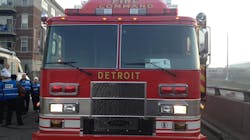Commissioner: Detroit FFs Not at Risk over Cleanup
Source Firehouse.com News
A new cleanup policy requiring Detroit firefighters to wash away blood and other possibly dangerous fluids at emergency scenes isn't creating unnecessary health risks for first responders, according to the city's fire commissioner.
In a statement released Thursday, Commissioner Eric Jones said Detroit firefighters have received sufficient training and are outfitted with the proper gear when it comes to safely handling potentially hazardous biological material, such as blood and other bodily fluids. Those reassurances come after the Detroit Fire Fighters Association filed a complaint with the Michigan Department of Occupational Safety and Health Administration earlier this week over concerns that the city's newly introduced cleaning procedure puts union members at risk.
Under the new policy, which started Tuesday, first responders must hose away human fluids from accident, crime and other emergency scenes. The fluids are then to be flushed down sewer drain, and contaminated material, such as bloody clothing, must be collected in special bags and disposed of properly.
"Firefighting personnel are authorized to perform a 'washdown' to remove bodily fluids from public view on public streets and thoroughfares," Jones said in a statement. "The 'washdown' process utilizes many gallons of water to dilute bodily fluids thereby removing them from public access."
The department's medical responders also have received blood borne pathogens training, which is mandated by the state, he added.
But according to the union's complaint, which was filed by its president, Mike Nevin, Detroit firefighters "have no knowledge of proper procedures involved as this is not Fire Fighting or EMS work," Metro Times reports. Nevin also told the news outlet that safety equipment, such as bags to handle contaminated material, hasn't been provided.
Jones, however, says that's not the case.
"All emergency responders in the Detroit Fire Department have been issued personal protective equipment such as gloves, masks, tyvek suits, bio-hazard bags, sharps container and disinfecting wipes," he said in a statement.
The department also will work with an environmental cleanup contractor to handle some incidents, Jones said.






